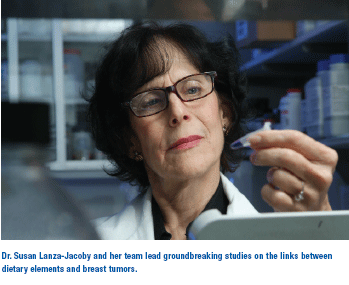
Recommended Citation
(2007)
"More Veggies, Less Breast Cancer: Unlocking One Secret to Prevention,"
Jefferson Surgical Solutions: Vol. 2:
Iss.
1, Article 5.
Available at:
https://jdc.jefferson.edu/jss/vol2/iss1/5
Included in

We all know that eating a balanced diet is good for us. Susan Lanza-Jacoby, PhD, the Principal Investigator of the Cancer Biology and Nutrition Laboratory in the Department of Surgery, is taking this conventional wisdom to new scientific heights. She investigates molecular abnormalities involved in the development of breast cancer and aims to identify novel strategies using food components for prevention and treatment.
"We’re striving to show how dietary supplements can slow down – or even stop – the incidence of breast cancer, and also improve the effectiveness of chemotherapy,” Dr. Jacoby explains, “so that a woman can take lower doses and also minimize the side effects."
Learning how to prevent or treat tumors in the human breast requires working in her lab with "transgenic" mice – those with compromised immune systems that receive implanted tumor cells. The mice are made to overexpress a cancer-causing gene (HER-2/neu), which inevitably results in them developing mammary tumors. (This is the laboratory equivalent of being genetically predisposed to getting breast cancer.)
"Breast tumors that overexpress this gene are aggressive," says Dr. Jacoby. "They account for between 20 and 25 percent of all breast cancer in women, and do not respond well to standard treatments, which results in a poor prognosis for the patient."
Her research suggests that a number of dietary factors can have cancer-fighting properties. Diindolylmethane (DIM) is a component of certain vegetables, called cruciferous (such as broccoli, cauliflower, cabbage, and Brussels sprouts), and members of Dr. Jacoby’s lab have been observing that it can decrease growth and even kill breast cancer cells that result from overexpression of the HER-2/neu gene.
"We're striving to show how dietary supplements can slow down - or even stop - the incidence of breast cancer."
She explains that mice fed our Western diets took about 6 to 7 months to develop breast tumors; whereas when they fed DIM to the transgenic mice, it took over a year to develop the tumors. "This is a significant delay," she explains, "Consider the potential for helping genetically predisposed adolescent girls delay the onset of cancer until well into their 50s or 60s."
Dr. Jacoby is also investigating how to develop combined therapies that will prevent the development of breast tumors. A multitargeted approach based on the characteristics of the individual tumor has provided more effective prevention and treatment. "We measured the growth of tumors in the mice, and when we used a combination of the DIM supplement and docetaxel, a chemotherapeutic another agent, there was a significantly slower rate of tumor growth." She is also finding that a COX-2 inhibitor, used in combination with other agents, can prevent the incidence of breast tumors altogether.
In July Dr. Jacoby was awarded a research grant from the Pennsylvania Department of Health to continue her study of the role of the ErbB and COX-2 signaling pathway in HER-2 breast cancer. Thanks to a grant from the U.S. Department of Agriculture, she is developing a teaching module about the role of nutrition and cancer prevention, which will mean her exciting findings to date will have a direct path into patients’ lives.

